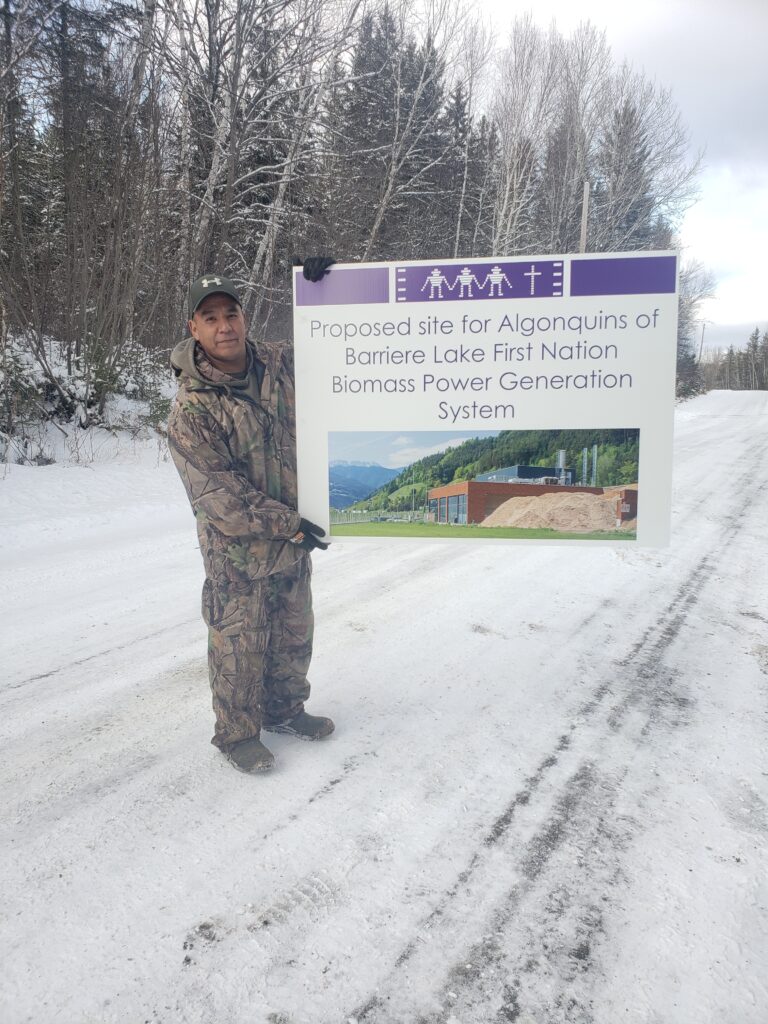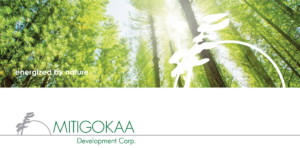Any questions ?
Phone (705) 303-8344
Phone (705) 303-8344

Algonquins of Barrier Lake First Nation
Chief and Council signed a Letter of Intent with Mitigokaa Development Corp. On November 6, 2019 to complete a feasibility study on a proposed biomass power generation station to replace the current diesel generators.
Work on the Feasibility Study immediately began by ABL and Mitigokaa. A number of visits to the community followed by Mitigokaa and to view the current power plant and community infrastructure. Meetings were held with Chief and Council to discuss the proposed power plant and review details such as selecting a plant location, biomass feedstock sourcing and plant operations.
A number of meetings were also held with ABLFN government partners including Indigenous Services Canada, Ministry of Aboriginal Affairs, Ministry of Energy and Natural Resources, Ministry of the Environment.
The Feasibility Study was completed by Mitigokaa on May 8, 2020. Mitigokaa participated in three (3) meetings with Chief and Council to review the Feasibility Study findings. Chief and Council approved the Feasibility Study report on July 14, 2020 by Band Council Resolution #07-13-2020.
Chief and Council directed the launch of Phase 2 of the development cycle through BCR #07-13-2020 which includes more detailed design and engineers, permitting negotiations with the Crown, and financing discussions with ISC and investors. A number of key correspondence were issued by Chief and Council to the various government partners requesting participation in an Algonquins of Barriere Lake Energy Working Group, which will be community led initiative to solve the energy crisis facing the community.
A more detailed business case will be presented back to Chief and Council and community at the end of Phase 2.


Mitigokaa (pronounced Ti-go-kaa) Development Corp. (MDC) is a Canadian electricity generation developer specializing in Biomass power generation in remote off-grid communities. One third of Mitigokaa’s founding partners are respected First Nations leaders. Using proven biomass boilers along with Organic Rankin Cycle (ORC) generation technology, Mitigokaa can deliver base load, ‘24/7’, renewable electricity at a fraction of the current cost of diesel generated power. Mitigokaa principals bring over 100 years of collective experience in utility and infrastructure development and financing in thirty countries.
For more information about Mitigokaa, visit their website: https://mitigokaa.com/
To read about Mitigokaa leadership, visit the website: https://mitigokaa.com/leadership/
MDC Project Development Cycle
Letter of Intent (LOI)– The LOI is a non-binding agreement to start assessing the proposed biomass power generation project through a feasibility study. It clearly outlines the responsibilities of both the community and Mitigokaa Development Corp. The LOI is approved by Chief and Council through Band Council Resolution.
Phase 1 Feasibility Study – Community developed with technical support from their development partner, Mitigokaa Development Corp. An assessment of the power requirements of the community, the proposed power plant operations, technical and equipment requirements, land requirements, costing analysis, biomass fibre feedstock requirements (sourcing and costs), opportunity costs versus other energy solutions. The main questions to answer are: Is the proposed biomass power plant technically feasible to supply power to the community? Is the proposed biomass plant financially feasible as compared to other options?
Review and Acceptance of Feasibility Study – The Feasibility Study findings will be presented to the community and Chief and Council. Based on successful Feasibility Study findings, Chief and Council will approve the Feasibility Study Report by Band Council Resolution and will then direct Mitigokaa Development Corp. to move into Phase 2 of the Development Cycle.
Phase 2 – More detailed design, costing, permitting, financing options must be undertaken by the community with support of Mitigokaa. Our engineering team will complete more detailed engineering design of the proposed power plant. We will assess permitting requirements and begin discussions with the required ministries. Discussions and negotiations on power purchase agreements with utilities/government. Detailed discussions with potential investors and lenders and initial negotiations on required financial agreements – Phase 2 is approximately a 12-month process.
Community Engagement and Approval – Throughout the entire development process, it is imperative for Chief and Council and Mitigokaa to inform the community members of the proposed biomass power generation project and to keep members apprised of any developments. A Community Approval process will be developed and followed by Chief and Council and Mitigokaa.
Memorandum of Understanding (MOU) – After the community decides to accept the project details and proceed, a MOU will be approved by Band Council Resolution and signed by Chief and Council.
Notice to Proceed (NTP) – A NTP will also be approved by Chief and Council, as per community approval and direction to begin the construction of the power plant. This will be followed by stringent commissioning, performance acceptance testing and final acceptance of Utility.
Project is complete and operational. Mitigokaa will stay on for as long as needed by the community to support management with operations, maintenance, training, board of directors, etc.

Mitigokaa wants to improve its communications and listen to your concerns, questions and comments. This platform allows you to learn about the company and its biomass project. The platform also allows you to ask your questions.